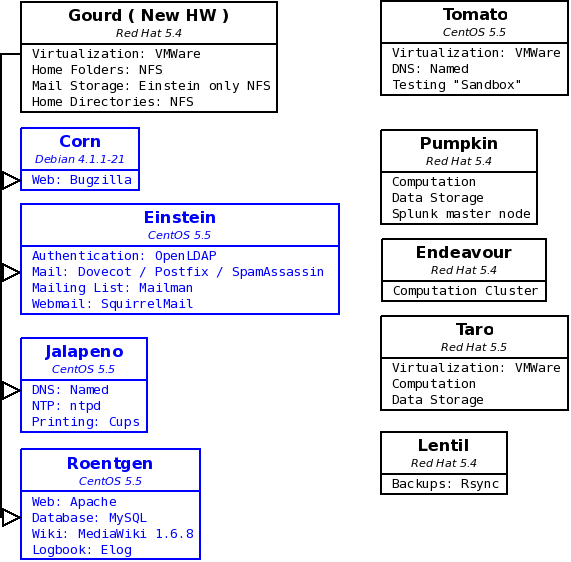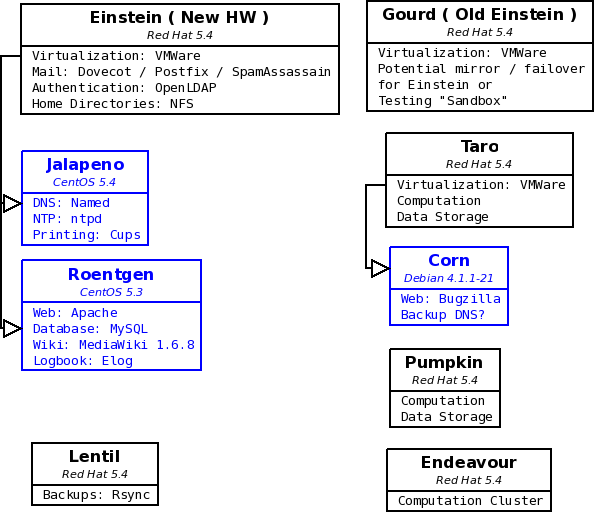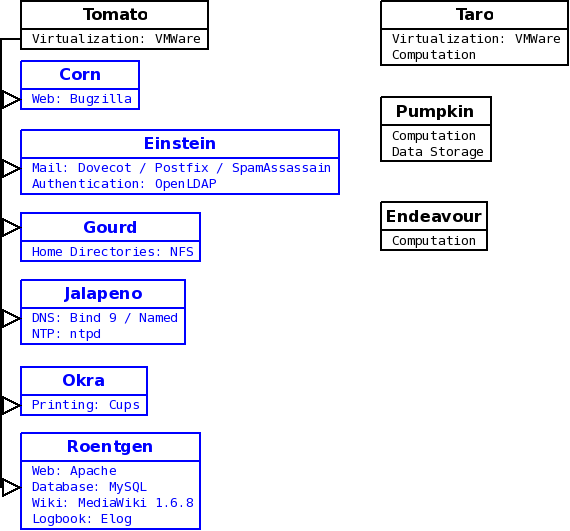Difference between revisions of "NPG Layout"
m |
m |
||
| Line 18: | Line 18: | ||
= System Redesign = | = System Redesign = | ||
| − | + | These notes describe the migration from the old system layout with the original hardware [[Old_einstein|Einstein]] to the current [[Gourd]] hardware / [[Einstein]] VM design. | |
| − | |||
| − | |||
| − | == First | + | == First Proposed Redesign == |
This updated diagram incorporates Maurik's suggested changes: | This updated diagram incorporates Maurik's suggested changes: | ||
| Line 37: | Line 35: | ||
It is not known yet whether the old Einstein will be usable as a mirror / failover for the new Einstein. This should be investigated. If it is, we should also investigate whether it will need a Red Hat license, or if CentOS will be sufficient. | It is not known yet whether the old Einstein will be usable as a mirror / failover for the new Einstein. This should be investigated. If it is, we should also investigate whether it will need a Red Hat license, or if CentOS will be sufficient. | ||
| − | === | + | === Second Proposed Redesign === |
This design is deprecated, but left here for reference purposes. | This design is deprecated, but left here for reference purposes. | ||
Revision as of 21:08, 28 May 2010
Current System Design
Systems Diagram
Here is a diagram of our current system layout.
Black Systems represent physical hardware.
Blue Systems represent Virtual Machines
Arrows indicate which system a Virtual Machine is running on. Other hosts with VMWare capability can be used to fill in for the main Virtualization server during downtime.
Operating System is listed in italics beneath each system's name
Services are listed in the second row of the diagram, followed by the specific software used to provide that service.
System Redesign
These notes describe the migration from the old system layout with the original hardware Einstein to the current Gourd hardware / Einstein VM design.
First Proposed Redesign
This updated diagram incorporates Maurik's suggested changes:
Questions / Concerns
This design attempts to minimize the number of virtual machines which frees up a couple of host names. I made Corn a backup DNS server that would run on Taro because this is the best way to failover in case something happens with Jalapeno. Even if Einstein goes down entirely we'll at least have one DNS server still running.
Corn is running Debian and is designed to be a standalone Bugzilla appliance. It is not known whether this will make it difficult to add the DNS functionality ( it should be as simple as installing the service and copying the configuration from Jalapeno ). This needs to be investigated. An alternative is leaving Corn as a standalone and using the Okra virtual machine to provide printing as well as acting as a backup DNS.
It is not known yet whether the old Einstein will be usable as a mirror / failover for the new Einstein. This should be investigated. If it is, we should also investigate whether it will need a Red Hat license, or if CentOS will be sufficient.
Second Proposed Redesign
This design is deprecated, but left here for reference purposes.


